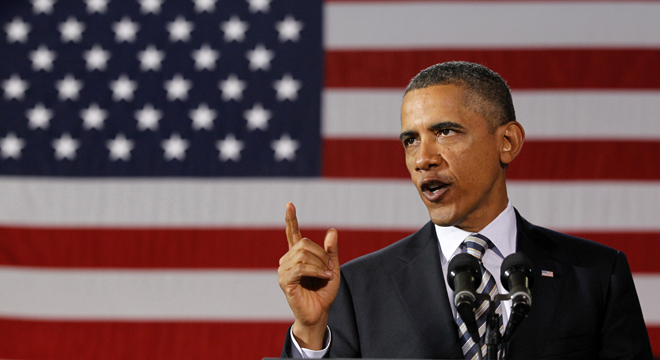President Obama has addressed the country before a joint session of Congress several times since he was sworn in three years ago. But none have had as much political relevance and agenda-setting potential as his State of the Union address will have Tuesday night.
His aides have been as tight-lipped as you might expect about the particulars. But broadly the administration has signaled that the President will build on themes he’s helped draw into the national conversation over the past year, most recently in a speech he gave in Osawatomie, KS — inequality, economic fairness, and the decades long stagnation of the middle class. He’s expected to make a spirited case for addressing those problems — by building out new protections for consumers and workers, and by undoing existing policies that rig the game for the wealthiest Americans — all while drawing a stark contrast with Republicans ahead of an election in which the White House and both chambers of Congress are up for grabs.
“We can go in two directions — one is toward less opportunity and less fairness,” Obama said in a video previewing his SOTU speech. “Or we can fight for where I think we need to go: building an economy that works for everyone, not just the wealthy few. On Tuesday night I’m going to talk about how we’ll get there.”
It will be the first opportunity Obama’s had to frame the election on his own terms before a large national audience, and will likely be the best opportunity he’ll have for months to come. He has said the speech will be “a bookend to what I said in Kansas last month,” in which he stressed a populist, progressive economic message.
The Osawatomie speech inspired a strong backlash from Republican leaders in Washington — in part because they understood that an election framed on the President’s terms would be difficult to win. The question for Obama tonight is now how strongly he follows through in the speech itself, and then how he keep trying to turn rhetoric to reality as he presses a gridlocked Congress to move ahead with real reforms.
The address will be “a great opportunity for the President to continue to move away from Washington thinking — about right versus left — and to move back to what Main Street wants, which is protecting and advancing the middle class and economic security,” says Tom Perriello, a former Democratic Congressman and recently appointed head of the Center for American Progress Action Fund, an influential progressive advocacy group. “The question is whether Congress is going to take this as a call to action or resort to politics as usual.”
It would be a lot to ask of even a well-functioning Congress to pass the sorts of major economic reforms that would be required to end a decades-long systemic economic problem. And as House GOP Leader Eric Cantor acknowledged Monday, the sorts of issues that underlie that problem will not be resolved until after the election.
But Obama will have a real opportunity to lead Democrats into the brewing legislative battle over full-year extensions of the payroll tax cut, unemployment insurance and Medicare “doc fix.” Insiders expect Obama to capitalize on the Democrats’ December victory over Republicans — who were forced to buckle on a package of two month extensions — and warn GOP members not to hold the measures hostage to unrelated policy disagreements, or partisan pay-fors.
GOP leaders say they might try to force the administration to reverse its decision on the Keystone XL oil pipeline as the necessary price for renewing the payroll tax cut and other provisions. Obama could use the State of the Union Address to end that effort in its infancy.
But the broader policy impact will be minimal — at least until the election.
Campaign politics are likely to permeate every major aspect of legislative business this year, and both parties are acutely aware that, beyond the payroll tax package, little else of major importance will be accomplished between now and November. That’s not unusual for an election year, but it’s particularly key to understanding politics this year. The 2012 elections aren’t just shaping up as a referendum on Obama’s first term, but as a referendum on the generational fight between the parties over the social safety net, and which vision should steer the nation moving forward.









